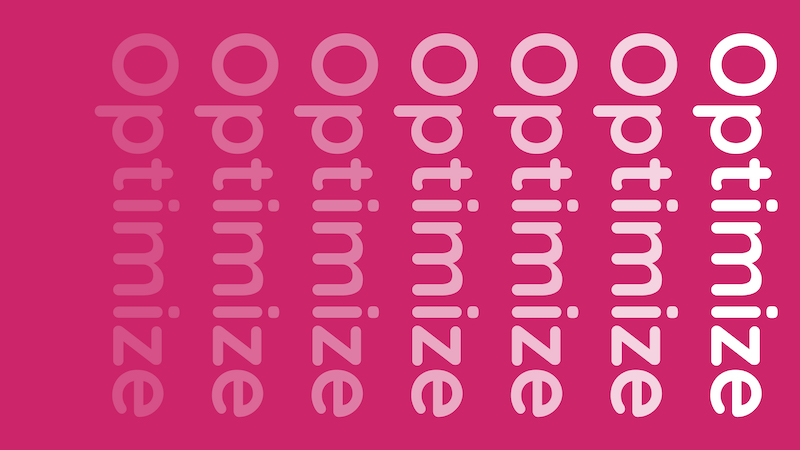In this series, Unpacking Jargon, we demystify a digital marketing phrase or term that is widely overused, misunderstood, or intentionally vague.
This week, we are talking about the terror of the vague but omnipresent, optimize.
Uses:
- “We just need to let the campaign optimize over a few weeks.”
- “Your website looks good, but it’s not optimized.”
- “Your Google My Business listing is claimed, but it’s not optimized.”
- “This blog post is fine but could use some keyword optimization.”
I’ve heard (and said) these phrases on thousands of digital marketing calls.
Let’s start with the core definition and then get into uses within digital marketing.
Definition of Optimize
I usually hate any sort of speech, sermon, or presentation that has a definition in it, but fortunately, this is a post entirely about what a word means. So, I’m going to throw out my personal preference and turn to Oxford Languages like a high school freshman writing their first paper.
Optimize (v): to make the best or most effective use of (a situation, opportunity, or resource).
I really like thinking of the core definition of optimize within the context of digital marketing. In that sense, optimize is referring to something that already exists. It is a thing that is in motion, is working, and is functional, but is it doing the best it could?
That question is what drives digital marketing professionals — and employs them. Also, I should add, that question is what gives the term optimize some actual meaning in the world of digital marketing. So why does it feel like it’s used as filler so often?
Why Is Optimize a Crutch Word
Digital marketers work in pretty complex systems and platforms. When we are talking with a client, we never want to get overly technical. The last thing we want to do is confuse or isolate a client from a conversation about their business. It’s bad bedside manner, so to speak.
So digital marketers tend to lean on a word like optimize because it very neatly describes a thousand intricate actions. The message they are really trying to convey to the client is that the website or campaign that’s been deployed is functional, but there are areas of performance they intend to improve.
A Tune-Up, Not a Repair
The visual I usually give to people when talking about optimization is like that of a tune-up from your mechanic. Your car is working, right? Like, you can still get from A to B without getting stranded. But you know the car could be running better. You take it to a mechanic who will first assess what’s needed and then improve the car.
There is more you can get out of your car and an expert can help you get that. This is very much the same when it comes to how we optimize in the digital marketing space. Going back to the car comparison, it gives us the opportunity to unlock existing features that perhaps weren’t accessible, or to improve the performance of the ones you were already using.
Great. But What Are They Actually Doing?
Great question! It completely depends on the digital marketing tactic. Here are only a few examples of actions for some common tactics:
Website Optimization
- Assessing the call-to-actions on pages: Is it clear what we want the user to do?
- Restructure content: Does the page use headers in a way that’s good for users and Google?
- Redesign: Is the design guiding the user through the website and to a conversion point?
Google Ad Optimization
- Rewrite and test ad copy: Is there a phrasing that’s working well to get clicks and is there another way to approach that copy?
- Improve a landing page: Does the landing page push the user toward our conversion goal?
- Modify bids: Do we want to pay 20% more for specific keywords or target regions?
Content Marketing Optimization
- Distribute keywords: Are we using a particular keyword too much or are there opportunities to rewrite content in a way to add more keywords?
- Research keywords: Are we actually addressing the questions that users are asking search engines?
- Plan content: Is the content we’ve written reaching the right audience with the right message and how can we better achieve that in future pieces of content?
This is just a tiny snippet of what a great technician would look at to optimize your digital marketing performance.
How Can I Better Speak To Optimization With My Agency?
While it’s great to trust your digital marketing technicians, it never hurts to ask for a few specifics. If you hear your agency say over and over again that they will “optimize” the campaign without any detail, then you deserve some clarification. Here are some good questions to ask.
What actions are you going to take to optimize the campaign?
Or more positively, what specific information can I give you to help you optimize the campaign?
Often things like sharing which call-to-actions are working well, new creative you rolled out, or even questions you get asked by customers are the best way to help them out.
The Future Will Be Optimized
Marketing isn’t a perfect science and digital marketing tactics can almost always improve. You will likely always hear from your digital marketing team that they want to make a few optimizations and that should be encouraging.

